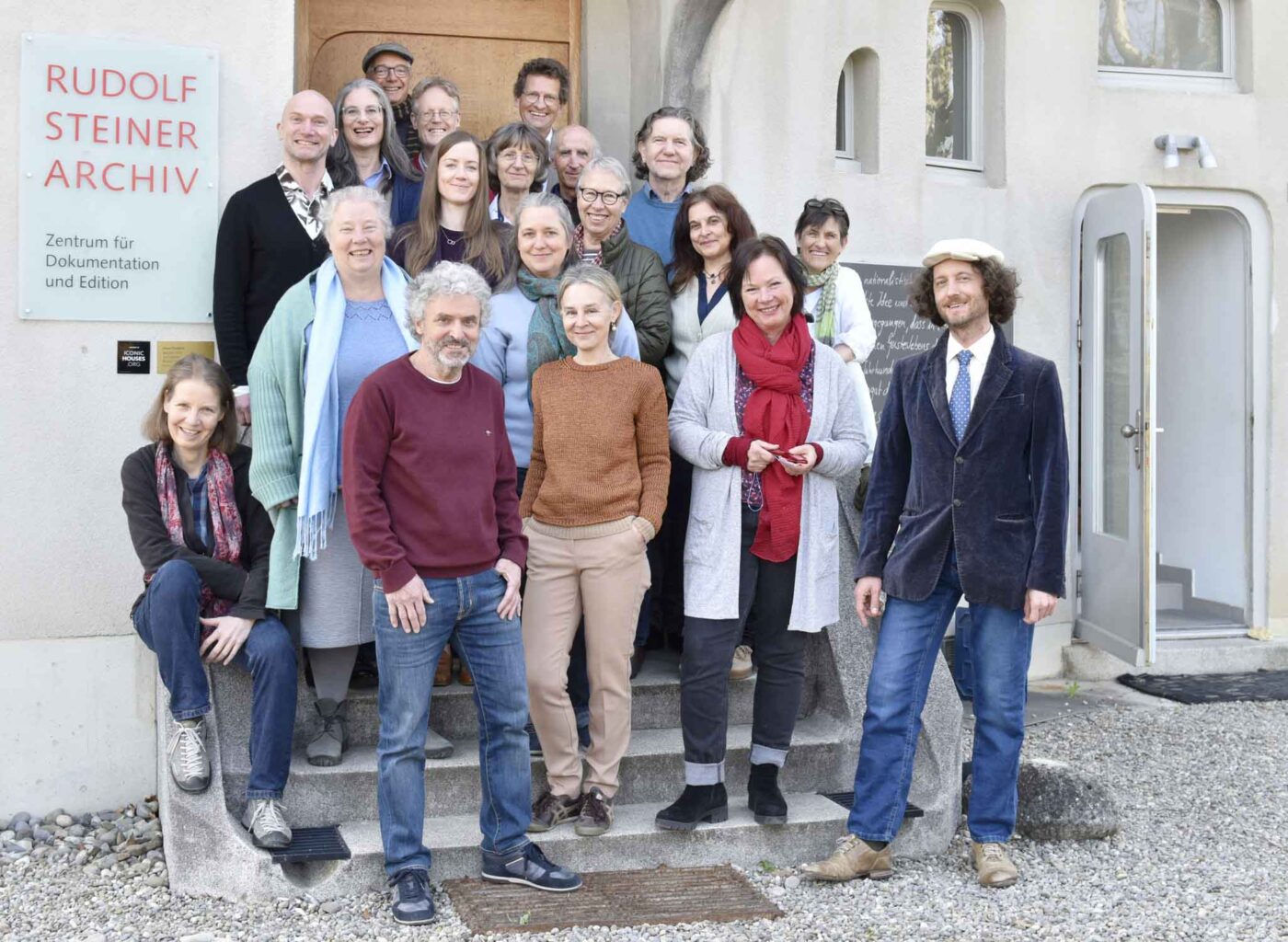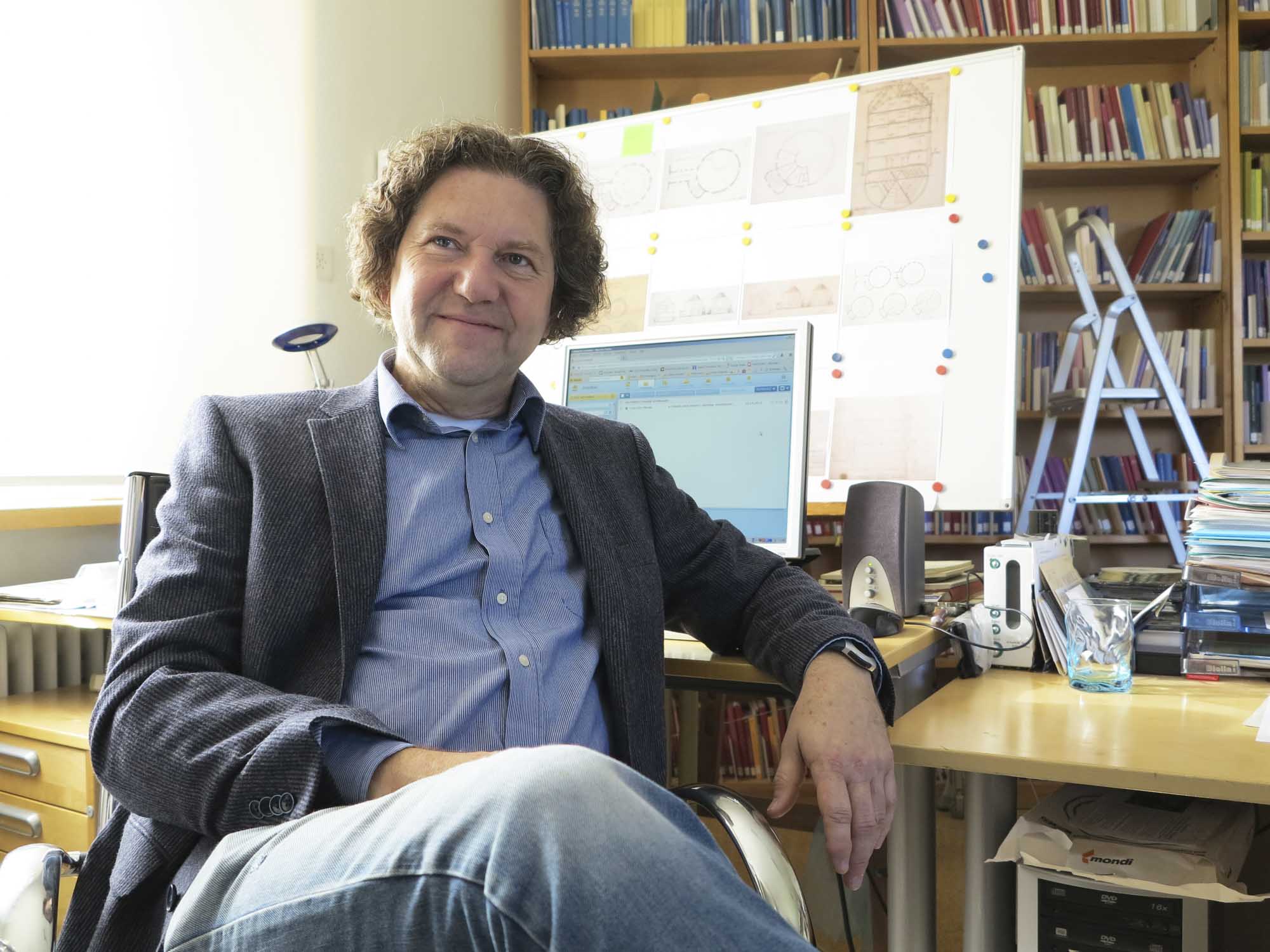A touching collection of memories, written by his colleagues at Rudolf Steiner Archive after his unexpected death this autumn, reveals Roland Halfen to have been remarkably prolific and engaging, while working humbly behind the scenes.
Roland Halfen worked on Rudolf Steiner’s Collected Works since 2002, producing volumes dedicated to Steiner’s artistic work. Halfen initially worked as a freelancer until 2004, when he began working as a full-time editor at the Rudolf Steiner Archive in Dornach. He arrived as a proven art historian (the first volume of his four-part, monumental monograph on Chartres had just been published) and as an accomplished philosopher, who had co-published the two-volume Große Werklexikon der Philosophie [Comprehensive Dictionary of Philosophical Works] (1999), as an author and co-editorial assistant to Prof. Franco Volpi. In collaboration with Walter Kugler until 2011, and then continuing on his own, he edited the large-format volumes of Steiner’s Collected Works: Das graphische Werk [The Graphic Work] (2 vols., GA K45, 2005); Das malerische Werk [The Painting Work] (GA K13–16, 2007); Das plastische Werk [The Sculptural Work] (GA K11, 2011); Das Architektonische Werk I und II [The Architectural Work I and II] (GA K1–10; 57, 2022 and, posthumously, GA K27–43, planned for 2024). In addition, he edited and published the lecture volumes Architektur, Plastik und Malerei des ersten Goetheanum [Architecture, Sculpture, and Painting of the first Goetheanum] (CW 288, 2016), Der Baugedanke des Goetheanum [The Building Thought of the Goetheanum] (GA 289, 2017) and Zur Geschichte des Johannesbau-Vereins und des Goetheanum-Vereins [On the History of the Johannes Building Association and the Goetheanum Association] (GA 252, 2019). His publication Kunst und Erkenntnis: Rudolf Steiners “Ästhetik der Zukunft” [Art and Knowledge: Rudolf Steiner’s “Aesthetics of the Future”] also appeared in 2019.

Roland Halfen retired at the end of July 2023 but agreed to assist with the volume Architektonische Werk II, which was nearing completion, and see it through to publication. Volumes on Steiner’s artistic works differ from volumes of lectures in that they are comprehensive presentations (monographs) written exclusively by the hand of a single author, Roland Halfen. Of course, Roland only ever wanted his volumes to be understood as editions of Steiner’s works and did not see himself as an author in this context. He, who had quite a lot “up his sleeve,” never upstaged or placed himself in a superior position over his subject matter. At most, here and there, he asked questions, almost reticently, always in context, and as a complement to the matter at hand.
Roland Halfen’s editorial work was characterized by his eye for detail and for the whole, together. His phenomenological approach was elaborate—he looked carefully and impartially and observed closely before drawing conclusions—a virtuous effort for any scholar of the humanities. His unique outlook was evident in his research trips and his photographic work. Roland not only sought out the works he was researching and writing about “in situ,” he also tried to capture them photographically and, most importantly for him, from the appropriate perspective. Along these lines, he even took time to capture what was most obvious, most nearby: the view from the window of House Duldeck (where he worked) onto the Goetheanum, in changing seasons and times of the day. He brought out new aspects from what appeared so familiar. Likewise, he was averse to any preconceived patterns of thought and always maintained his own independent point of view.

As an art historian, he was equally at home with antiquity (coupled with his knowledge of ancient philosophy) as he was with Gothic or contemporary art. One of his major concerns up until his death was the “Beuys bashing” that had been going on for some time, which, in his opinion, completely misjudged the significance of this artist.
Roland was a cosmopolitan human being with endearing idiosyncrasies. He arrived punctually for meetings but hardly ever a minute too early. He contributed a comprehensive, independent outlook of anthroposophy, cultivated a lively, joyfully controversial, but dignified culture of debate, and was always able to contribute surprising syntheses or dialectical “sublations” of opposing positions. When the situation called for it, he also knew how to get the laughs with his dry and felicitous humor.
He always sought an exchange with us, his colleagues. He initiated an in-house research colloquium and brought political and social issues into meetings and discussions. In personal encounters in the kitchen or across the desk, he was always willing to get involved in a wide range of topics and discuss them in detail, from peeling a mango to mysticism and mystery sites. As an original and critical mind, he questioned what he uncovered and cleared up many myths. Some things he explained quite matter-of-factly; for example, that the two linden trees planted on the Felsli [in the Goetheanum park] were planted so that a hammock could be stretched between them.
Roland loved to work evenings, undisturbed in his archival cell, late into the night, often accompanied by a delivered pizza. He put his personal stamp on everything he did and everything he was involved with. His work will resonate for a long time to come in the collaborative, collegial harmony of the staff at the Rudolf Steiner Archive. It is, therefore, all the more regrettable that he never completed his plan to compose the history of the archive itself. We are deeply saddened by his sudden departure from the earth and will hold his memory in honor.
Nana Badenberg, Péter Barna, Andreas Bindler, Marianne Büttner, Claudia Forster, Silvana Gabrielli, Sophia Galsterer, Christiane Hoffmann-Champliaud, David Marc Hoffmann, Marit Frey, Andrea Leubin, Ralph Machunze, Monika Philippi, Roland Probst, Martina Maria Sam, Jacqueline Staub, Anne Weise, Stephan Widmer, Hans-Christian Zehnter, Renatus Ziegler
A list of Roland Halfen’s literature is available on the Rudolf Steiner Archive website
Translation Joshua Kelberman
Title image Roland Halfen at his workplace in the Rudolf Steiner Archive 2013 (Source: Ivana Suppan)













